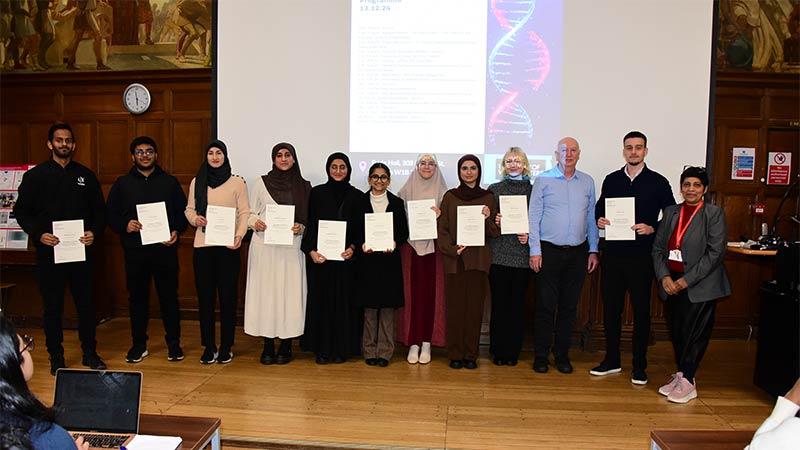Nearly 200 Westminster students joined to celebrate the end of the first phase of the University’s Gene Editors of the Future programme at the first CRISPR VIP students’ symposium. Held in Fyvie Hall at the University’s Regent Street Campus, the event marked a celebration of student perspectives, achievements and innovation.

Gene Editors of the Future is a vibrant student community within Westminster and is the longest and largest extracurricular initiative that focuses on CRISPR technology. The technology can be used to selectively modify the DNA of living organisms and has forever changed the landscape of genetic engineering.
The event was opened by Vice-Chancellor and President of the University Professor Peter Bonfield, who commended students for their commitment to Westminster’s values and networked learning. This was followed by Professor Dibyesh Anand, Deputy Vice-Chancellor of Global Engagement and Employability, who praised the diversity, motivation and engagement of the students. Dr Kalpana Surendranath, is a Reader in Genome Engineering at the School of Life Sciences who leads the Genome Engineering Lab, also spoke at the event and thanked her Co-lead Professor John Murphy and the PhD alumni Dr Nadeen Solaiman and Dr Ahmed Sidali for their support and contribution since the programme's inception.
Director of the Queen Mary Centre for Undergraduate Research, Dr Giuseppe Viola, joined the symposium, alongside inspiring student presenters who spoke on a range of topics from the improvisation of public transport to epistemology.
A total of 13 presentations were delivered and shared between the Queen Mary Centre for Undergraduate Research and Gene Editors of the Future programme. Dr Oliver Haworth, Senior Lecturer in Cell Biology, delivered a lecture titled The Journey of Genes, exploring how genes have shaped human evolution. This was followed by a talk on mitochondrial gene editing by Dr Ifigeneia Kalampouka, a PhD researcher in Quantum Biology based in the School of Life Sciences, who explored the interaction between light and biological systems, the field of photobiomodulation and light emitted from biological organisms for communication.
The event also welcomed participation from school pupils from St Charles Sixth Form College, as well as PhD and postgraduate students from other universities and international Bolashaq scholars.
The symposium, organised by student leaders Khalid Akram, Harshana Chaurasia, Maha Mansha Akhtar, Mishal Mansha Akhtar, Aya Hijazi and Sneha Rangan, showcased the talents of students and fostered collaboration and dialogue within the academic community. The event also gave students from the programme’s third year, Anshul Kumar Vasisht, Aya Hijazi, Nadine Benyahia, Nikiforos Lakos, Harshana Chaurasia, Mishal Mansha Akhtar, Maha Mansha Akhtar, Julia Gorczynska, Md Kawser Khan and Maha Mahboob, the chance to receive their Advanced Gene Editors Awards.
Dr Giuseppe Viola said: “The symposium showcased the exceptional talent and diverse capabilities of the students involved. The artistic venue provided an inspiring atmosphere, and the large audience reflected the students’ commitment to acquiring knowledge and skills, as well as their willingness to apply them for the benefit of society, which is remarkable given the early stages of their academic journeys. The presentations triggered questions and sparked vibrant exchanges of ideas among the students, also highlighting their openness and readiness for interdisciplinarity. The event clearly demonstrated that we should continue along this path, strengthening our collaborations and creating further opportunities to build on these achievements.”
Professor Dibyesh Anand added: “The event was remarkable in terms of being cutting edge, inclusive and purposeful. Seeing so many students from Westminster as well as other universities gather at the very end of the academic semester to share their work and ideas and interact with each other was humbling. It illustrated to us the power of science as a community endeavour and all this was possible due to the leading and enabling role played by researchers led by Dr Kalpana Surendranath.”
This symposium directly contributes to the United Nations Sustainable Development Goal (SDG) 4: Quality Education. Since 2019, the University of Westminster has used the SDGs holistically to frame strategic decisions to help students and colleagues fulfil their potential and contribute to a more sustainable, equitable and healthier society.
Find out more about the School of Life Sciences at the University.









